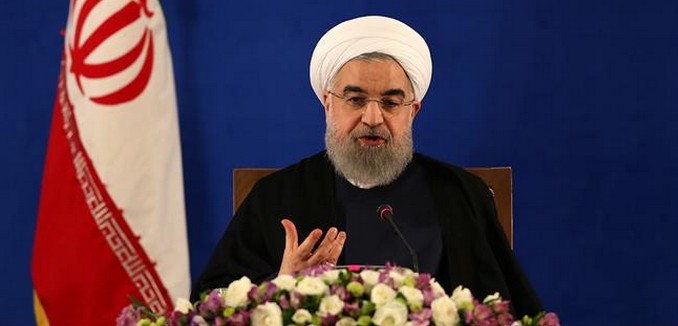Iranian President Hassan Rouhani, who was re-elected Friday, cannot be counted on to “deliver, or even try to deliver” any reforms he promised during the campaign, Eli Lake, national security columnist for Bloomberg View, wrote in an analysis of the Iranian presidential election Sunday.
Lake described Rouhani’s campaign promises:
During his campaign, he told voters that he would be a “lawyer” defending their rights. He criticized his main rival, Ebrahim Raisi, for his role in ordering the executions of political dissidents. He promised gender equality and a freer press.
While those promises sound encouraging, Lake wrote, “there is no reason to believe Rouhani will deliver, or even try to deliver, on any of these promises.”
The first reason why Rouhani isn’t a good bet to make good on his promises is because he didn’t reform or moderate Iran’s political culture during his first term, despite promises to do so. In fact, “human rights in Iran have further eroded during his tenure.”
The Center for Human Rights in Iran noted that in October of last year, Rouhani supported a law putting all journalists under government control. A year earlier, following the agreement on the nuclear deal, Iran cracked down on journalists arresting at least five. The eroding freedom of the press in Iran, prompted 29 members of the European Parliament to write a letter urging Iran to stop harassing and arresting journalists.
Lake further wrote that even if Rouhani wanted reform, he doesn’t have the power. “The real power in the country resides with the unelected supreme leader, Ali Khamenei, and the security services, which operate more like rival mafias these days, controlling many of Iran’s industries and businesses.” Rouhani can protest limited freedoms, something Lake noted that “he mainly does during elections,” but “ultimately it’s not his call.”
Moreover, the problem with pretending that Iranians had a real choice in the election Friday, Lake observed, “it leads to fuzzy policies aimed at strengthening reformers and moderates, while chalking up Iran’s arrests of dual nationals or its provocations of U.S. ships to the infighting of Iran’s hardliners.”
While Lake suggested that Western policy-makers push for real reform in Iran, they should be aware that “congratulating Iran for its fake elections only legitimizes a system where real elections are not possible.”
Similarly in February 2016, when parliamentary elections were hailed as being a victory for moderates, The Wall Street Journal observed, “The vote was a carefully stage-managed process. Iranians picked from among candidates prescreened for ideological orthodoxy by the unelected Guardian Council and various security agencies.”
The increased political oppression in Iran in the wake of the nuclear deal was described by David Patrikarakos in This Is Not What a “Moderating” Iran Looks Like in the Wake of the Nuclear Deal, which was published in the February 2016 issue of The Tower Magazine.
But in post-deal Iran the desire to resist U.S. influence and to reassert the Islamic Republic’s fundamental self is no longer confined to rhetoric—and here we come to the second level. While nothing approaching the mass slaughter of the late 1980s has occurred, the regime is unquestionably starting to clamp down on dissent and “foreign agents”—real or imagined. And it is here that the intensifying post-deal battle between hardliners and those cautious reformers within the regime who remain wedded to the Islamic Republic but want improved relations with the West, is most obviously seen.
Care needs to be taken here. The term “reformer” can be a misleading one. Rouhani and Zarif are certainly reformist-minded when compared to Khamenei, but they remain fixtures of the Islamic Republic’s establishment class and will not threaten its core values. More serious potential reformers—like the many people excluded from the candidate lists for the upcoming parliamentary elections in February (including Khomeini’s grandson), not to mention Mir-Hossein Mousavi, who, after being cheated out of his presidential victory in 2009, became something of a genuine reformer and sits in house arrest in Tehran to this day—are not allowed anywhere near the levers of power.
[Photo: PressTV ]




